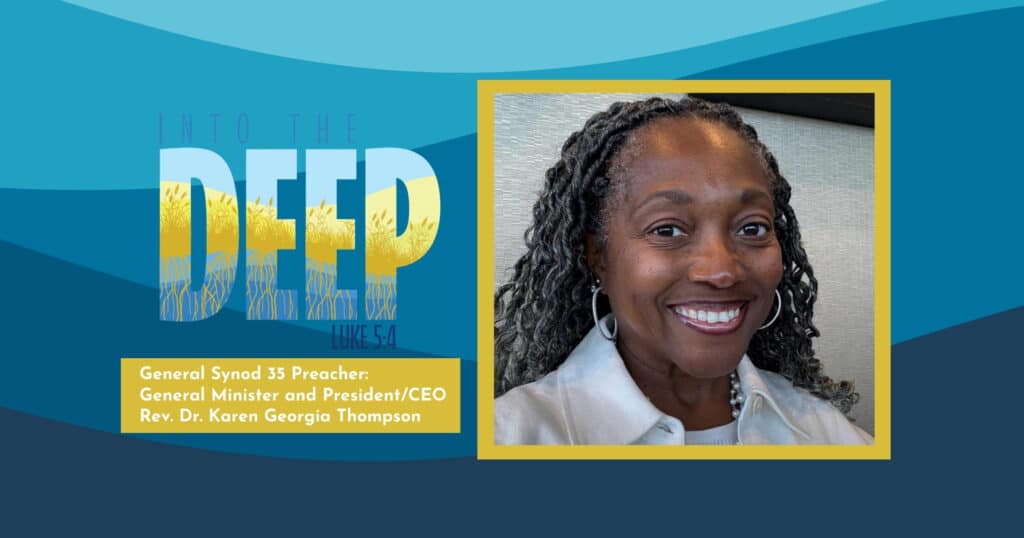Advocates ask church to embrace contemplation, rethink ‘Earth’s rights’
The 2021 General Synod of the United Church of Christ, meeting July 11-18, will consider 11 resolutions and several bylaw changes. This is one in a series of articles about them. Readers can view an initial summary here and find full texts at the Synod website.
How Christians reflect on their activism, and how they view the Earth, will be topics at the UCC’s national meeting in July.
One proposal would urge the entire church to base its activism on “a life of foundational spiritual practices.” “Becoming a Church of Contemplatives in Action” will require a two-thirds vote of delegates to pass. It will go directly to a plenary session on July 11, the opening night of Synod.
Another asks the Synod declare that Earth has certain rights and should be seen “not as an ‘it’ but as a ‘thou.'” “A Resolution on the Rights of Nature” will also require a two-thirds vote. A committee of delegates will review the document, starting July 15, before it goes to plenary.
Hunger for contemplation
The pace of in-person General Synods gave two Massachusetts ministers the idea for the “contemplatives” resolution. The Rev. Matt Carriker, pastor of Agape Spiritual Community, Waltham, and the Rev. Mark Longhurst of Williamstown were delegates to the 2017 Synod in Baltimore.
“Mark and I saw how little space for silent prayer and contemplation existed at Synod,” Carriker said. “We made a request for more such spaces at Synod 2019.” They got a positive reply — inviting them to lead the effort. They said yes.
“Thankfully, Synod organizers gave us a room for creating a ‘Quiet Prayer Space’ in 2019,” Carriker said. “We had a fun time meeting daily for various meditation and contemplative practices during free time, inviting all who wanted to join. Many people expressed how appreciative they were of this space during our very busy Synod days.”
For Carriker and Longhurst, the Synod experience symbolized a need throughout the UCC. “Our denomination, though strong in social justice activism, has not been as strong in living out and resourcing churches and faith communities in the variety of contemplative practices that ground our faith,” Carriker said.
‘Diverse spiritual practices’
Inspired, the two began drafting a possible 2021 resolution and convened other UCC pastors and church leaders to discuss it. The result: 13 congregations from Massachusetts, Illinois, Maryland, New York, Ohio and Vermont signed up to submit the resolution to the 2021 Synod.
Jesus “rooted his ministry of teaching, healing and solidarity with the marginalized through a life of prayer, solitude, silence, and intimate relationship with God.”
:Proposed resolution on “Becoming a Church of Contemplatives in Action”
Among many points, the resolution’s background and “whereas” sections name:
- The example of Jesus, who “rooted his ministry of teaching, healing and solidarity with the marginalized through a life of prayer, solitude, silence, and intimate relationship with God.”
- The need to honor “a wide diversity of spiritual practices in the Christian tradition.”
- The power of “activism modeled in the contemplative spirit of Jesus,” especially as society confronts such problems as systemic racism and COVID-19.
- “Honest self-examination, reflective introspection and dialogue, and intentions and commitments to change” as fruits of contemplation.
‘A both/and church’
If it adopts the resolution as written, the Synod would:
- Urge UCC congregations to “become churches of ‘contemplatives in action,’ remembering the essential disciplines modeled by Jesus of silent prayer, meditation and practices to commune with the Divine.”
- Invite them to “commit to being a ‘both/and’ rather than an ‘either/or’ church — a church that prioritizes contemplation, spending time communing with God in various forms of prayer; and a church of activism that seeks to make God’s love and justice real in the world.”
- Encourage “training of future clergy and lay leaders in the ways of contemplation, spiritual practice and Christian mysticism.”
- Call upon “all settings” of the UCC “to invest in curriculum and resources to support conferences, associations, local churches, clergy lay leaders, General Synod and seminaries in practicing and teaching a foundational life of spiritual practices, as modeled in the life of Jesus.”
Contemplation “can help us love God more fully, and … deepen our living out the love and justice of Jesus.”
The Rev. Matt Carriker, proponent of the “Contemplatives in Action” resolution
Carriker said the resolution’s sponsors believe a new churchwide emphasis and resources could have an impact. Contemplation, he said, “can help us love God more fully, and from that place, to deepen our living out the love and justice of Jesus in all other areas of our ministries.”
“Our hope is that this resolution inspires a groundswell of movement from the bottom up in the UCC,” Carriker said. “Being a church of contemplatives in action shouldn’t be a controversial issue. It is what the gospel is about at its core.”
Legal rights for trees
The “Earth’s Rights” proposal seeks a shift in spiritual viewpoint, too. It asks the Synod to adopt a “Rights of Nature declaration” that would “foster respect and gratitude for Nature as divine gift” — and as something with legal rights of its own.
The wide-ranging resolution, submitted by the New Hampshire Conference, touches on everything from worship to biology to legislation.
Nature and its components have “rights to exist, thrive and regenerate just as humans have rights.”
The Rev. Robert Shore-Goss, proponent of the “Rights of Nature” resolution
“The international ‘rights of nature’ movement has exploded in this century,” said the Rev. Robert Shore-Goss, who is active in UCC Environmental Justice Ministries. A retired minister living in Orlando, Fla., he will speak in behalf of the resolution when the committee of delegates takes it up. “Seven countries have rights of nature in their constitutions or as ordinances in First Nation constitutions.”
For its title, the resolution borrows a 50-year-old question — “Who will speak for the trees?” — from a Dr. Seuss book, “The Lorax.” Its footnotes call attention to another book from that era — Christopher Stone’s “Should Trees Have Standing?” — an early legal argument for nature’s legal rights..
Shore-Goss said the movement — and the proposed resolution — define Nature “as ecosystems, forests and plants, wetlands and oceans, non-human animals and mountains.” These, he said, have “rights to exist, thrive and regenerate just as humans have rights. What is good for Nature, and the Earth, is good for humanity.”
‘Preach every six weeks’
If the Synod were to adopt it as written, it would also call on UCC congregations to take actions such as these:
- “Include creation care” in worship in every season, using resources like those from the ecumenical Season of Creation.
- “Preach every six weeks … on Earth justice.”
- Become a Creation Justice Church.
- Study the “Kairos Call to Action” and carry out its 10 ways to mobilize.
- Work for the Green New Deal, a congressional proposal that lays out a plan for tackling climate change. It was endorsed by the 2019 Synod.
- “Take part in climate strikes and non-violent protests.”
“The resolution asks the UCC to examine our moral responsibility.”
The Rev. Robert Shore-Goss, proponent of the “Rights of Nature” resolution
It would also publicly proclaim a list of “principles” that includes calls to, among other things:
- Restore Environmental Protection Agency regulations and protections that have been repealed.
- “Promote economies of life rather than unregulated extractive economies that exploit resources.”
- “Prioritize renewable energies over fossil fuels.”
- “Encourage organic farming and regenerative agriculture.”
- “Respect all treaties with indigenous nations” and support them “in their de-colonization of Nature.”
“The resolution asks the UCC to examine our moral responsibility,” Shore-Goss said. “We are asked to listen and respond to the cries of vulnerable and damaged Nature.”
Related News
2025 Climate Hope Art Contest award winners plant seeds of hope
The celebration of the 2025 Climate Hope Art Contest for children and youth of the United...
Read More‘Not your typical webinar’: Womxn 2 Womxn series aims to foster community
As the church works towards gathering this summer at General Synod 35 in Kansas City,...
Read MoreThompson to bring a ‘prophetic and pastoral’ message to Synod: ‘We are not all the same, but still one body’
On Sunday, July 13, the Rev. Dr. Karen Georgia Thompson will take the stage at the 35th...
Read More



